The 20 Best Books for Language Lovers
Seeing as how the entirety of organic history exists thanks to communication — even rudimentary chemical exchanges between cells qualify — it makes perfect sense that many find the concept utterly engaging. Language pervades everything, building and destroying as time marches ever forward. And while even the most learned scholars can't even begin to fully explain its physiology, origins, structures and pretty much every other component, they've certainly done a pretty lovely job scratching the surface. Maybe a subcutaneous layer or two. While far more illuminating reads beyond these sit on the shelves, crammed with gripping concepts, the following provide a fantastic introduction. Diverse perspectives and suggestions abound, but don't think these necessarily represent all the possible answers!
-
Why You Say It by Webb Garrison:
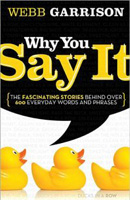 As one can probably ascertain from the title, Why You Say It explores the unusual (if not outright unexpected) origins of various English idioms. Over 600 figurative phrases — some widespread, some rare — come alive through Webb Garrison's fascinating research. History and anthropology buffs, too, have plenty of interesting information to peruse, seeing as how these subjects inextricably tie into linguistics.
As one can probably ascertain from the title, Why You Say It explores the unusual (if not outright unexpected) origins of various English idioms. Over 600 figurative phrases — some widespread, some rare — come alive through Webb Garrison's fascinating research. History and anthropology buffs, too, have plenty of interesting information to peruse, seeing as how these subjects inextricably tie into linguistics.
-
Eats, Shoots & Leaves: by Lynne Truss:
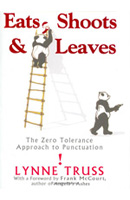 English language enthusiasts mourning its frequent abuse will probably find this book quite the comfort! Here, the author mourns linguistic apathy, particularly when it comes to proper punctuation use, and the myriad ways such mistakes can completely alter a sentence's meaning. Regardless of whether or not they speak the British, Canadian, Oceanic or American dialects, readers can nod sadly along.
English language enthusiasts mourning its frequent abuse will probably find this book quite the comfort! Here, the author mourns linguistic apathy, particularly when it comes to proper punctuation use, and the myriad ways such mistakes can completely alter a sentence's meaning. Regardless of whether or not they speak the British, Canadian, Oceanic or American dialects, readers can nod sadly along.
-
The Language Instinct by Steven Pinker:
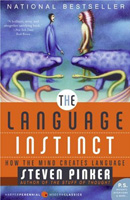 Pick up this MIT professor's lauded work explaining the psychological and cognitive functions that might lurk behind language formation and acquisition. Because scientists and linguists continue arguing over the complex biology of communication, any interested parties should explore the various perspectives. Steven Pinker stands at the forefront of such research, blending different disciplines together into one stimulating package
Pick up this MIT professor's lauded work explaining the psychological and cognitive functions that might lurk behind language formation and acquisition. Because scientists and linguists continue arguing over the complex biology of communication, any interested parties should explore the various perspectives. Steven Pinker stands at the forefront of such research, blending different disciplines together into one stimulating package
. -
Spoken Here by Mark Abley:
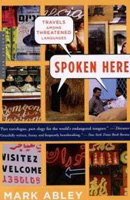 Just like organic matter, languages evolve over time to suit specific needs, and end up on their respective endangered or extinct lists. Here, a journalist explores some of the world's tongues currently (at the time of its 2005 publication, of course) tottering on obscurity and obliteration. But seeing as how that entails a tragically staggering 90% of 6,000 known languages, he can't exactly cover them all.
Just like organic matter, languages evolve over time to suit specific needs, and end up on their respective endangered or extinct lists. Here, a journalist explores some of the world's tongues currently (at the time of its 2005 publication, of course) tottering on obscurity and obliteration. But seeing as how that entails a tragically staggering 90% of 6,000 known languages, he can't exactly cover them all.
-
The F-Word edited by Jesse Sheidlower:
 To put it bluntly, The F-Word dissects the anatomy of an obscenity and chronicles some of its most notorious and notable appearances. An open mind is all it takes to learn more about what goes into establishing and using a profane word many still deem super harsh. And, of course, how frequent use dulls its initially rough edges until general acceptance settles.
To put it bluntly, The F-Word dissects the anatomy of an obscenity and chronicles some of its most notorious and notable appearances. An open mind is all it takes to learn more about what goes into establishing and using a profane word many still deem super harsh. And, of course, how frequent use dulls its initially rough edges until general acceptance settles.
Mother Tongue by Joel Davis: -
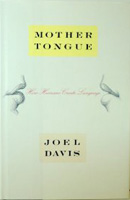 Science, history and linguistics (duh) collide in another highly informative glimpse at how language happens and, of course, evolves. For the most part, however, Joel Davis emphasizes the ways in which these subjects relate back to English. Any speakers wanting to know how it started meandering away from Germanic tongues would do well to check out this incredibly detailed book.
Science, history and linguistics (duh) collide in another highly informative glimpse at how language happens and, of course, evolves. For the most part, however, Joel Davis emphasizes the ways in which these subjects relate back to English. Any speakers wanting to know how it started meandering away from Germanic tongues would do well to check out this incredibly detailed book.
No comments:
Post a Comment